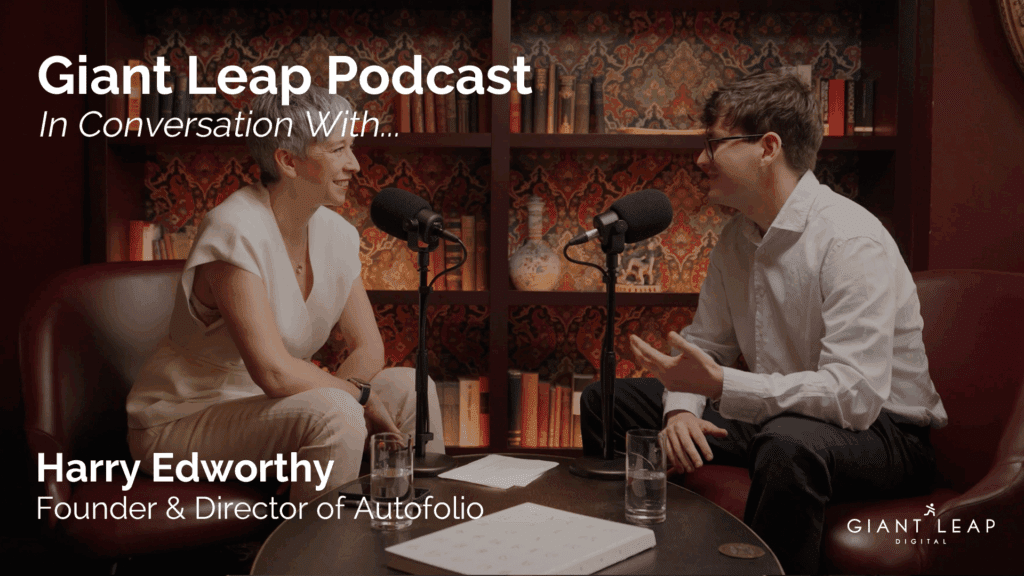At a time when social media feeds are overloaded with supercar montages and automotive flexes, Harry Edworthy, founder of Auto Folio, is quietly carving out a new category—where cars aren’t just toys for the wealthy, but legitimate, data-backed investment assets.
Edworthy’s startup, launched officially in 2024, offers consultancy services and digital products to help high-net-worth individuals buy cars not to drive—but to appreciate.
“We provide investment car advice to private individuals looking to acquire cars as assets,” he explained in a recent Giant Leap podcast. “Most cars depreciate. We focus on the 1% that don’t.”
At just 21 years old, Harry’s not just defying the odds—he’s redrawing them.
“We don’t run any paid ads,” Harry said. “Everything is organic.”

From Passion Project to Portfolio Builder
Auto Folio is what happens when finance meets obsession. Harry’s background in asset management gave him the financial toolkit. His teenage passion for photographing exotic cars gave him the eye. The market gave him the gap.
“There was no one providing unbiased advice on cars as investment assets,” he said. “Dealerships and auction houses all have skin in the game. I wanted to be on the buyer’s side.”
His solution: a model combining data-driven fundamentals, digital scale, and community-building content. What began as an Instagram page in early 2024 now boasts over 310,000 followers, a thriving ecosystem of digital products, and a paid consultancy service that’s attracting clients from the UK, US, Australia, Canada, and Romania.
Turning Cars into Assets: A New Investment Class
If art, wine, and handbags can be reclassified as investment vehicles, why not cars?
According to Harry, demand is driven by emotionally rooted nostalgia and demographically predictable patterns.
“The investment car market is very demographic driven,” he explains. “People in their 40s and 50s tend to buy the cars they wanted when they were teenagers but couldn’t afford. That’s why 80s and 90s cars are booming right now.”
And the returns speak for themselves. A Ferrari F40, originally valued at £180,000 in the late 80s, now sells for £2–3 million. Other icons—like the Porsche 993 or the Ferrari 355—have seen similar appreciation, especially in “end-of-run” or limited-edition models.
But not all cars are created equal—and most depreciate significantly. Harry’s digital guides aim to demystify the market. His top seller, Investment Cars 2025, offers a list of 50 high-potential vehicles, sorted by fundamentals like production numbers, desirability, and market momentum.

From Instagram to Asset Acquisition: Trust is the Engine
Auto Folio’s true innovation isn’t just financial—it’s experiential. Harry’s content ecosystem moves prospective clients through a clear funnel: they engage with case studies on Instagram, download free guides via ManyChat, receive value-packed email content, and eventually convert to buyers of digital products—or paid consultancy calls.
It’s not about “likes.” It’s about intent.
“We’re not chasing millions of views,” he says. “We’re chasing the right viewers. High-quality audiences. That’s what converts.”
And those conversions are sticky. The company boasts a 50% return customer rate for digital products and a growing cohort of high-value clients looking for hand-held acquisition advice. For those willing to spend £100,000+ on a car, a £50 guide that may save or make them thousands is a no-brainer.
“It’s a psychological thing,” Harry noted. “People are twice as scared of losing money as they are excited about making it. Loss aversion is a huge motivator.”
Disrupting an Industry That Doesn’t Want Disruption
Naturally, not everyone is thrilled. When Auto Folio posted a video advising followers to consider older Ferraris over new models, citing depreciation concerns, Ferrari’s UK PR team called Harry directly.
“They weren’t happy,” he said. “But we’re not here to please manufacturers. We’re here to give people unbiased, investment-led advice. That’s what sets us apart.”
In an industry built on exclusivity, mystique, and client relationship hierarchies, this transparency is almost radical. But Harry’s belief is unwavering: brands shouldn’t be above scrutiny.
“If a £250,000 car is going to lose £100,000 in three years, people deserve to know that.”

Scaling Smart: From Instagram Page to Investment Ecosystem
Auto Folio is no longer a one-man brand. With a core team of three and partnerships with agency collaborators, Harry is now expanding the Auto Folio ecosystem:
- Auto Folio Private Sales: a brokerage and sourcing division for clients seeking high-value cars.
- Auto Folio Capital: a planned financing service.
- Webinars and Workshops: Live events that have attracted international audiences, offering deeper access to insights.
- YouTube and LinkedIn: New channels to broaden brand exposure and thought leadership.
And yet, Harry’s approach remains lean, agile, and community-led. “We reverse-engineered this,” he said. “We built the audience first. Now we’re building the services they need.”
What This Means for the Future of Luxury
Auto Folio is a prime example of a new era in luxury consumption—one where value is measured not just in emotional returns but in financial ones, and where trust and transparency outperform prestige and polish.
It also mirrors a broader generational shift: the rise of substance over style, the demand for experiential credibility, and the reshaping of brand loyalty around content-first communities.
“The old model was: build a service, then market it,” Harry said. “Our model is: build a brand people believe in, and they’ll come to you.”
For luxury marketers, investors, and automotive purists alike, one thing is clear: the garage is no longer just a trophy cabinet. It’s a portfolio.
Want to learn more about how digital-first communities are reshaping luxury?
Explore Insights from Giant Leap Digital.
Instagram: @giantleapdigital


